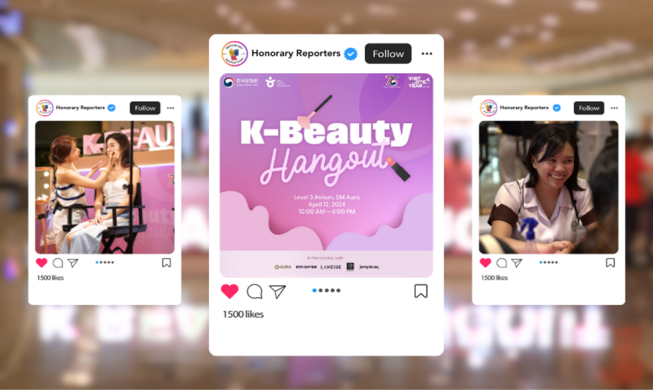-
 Korea.net's 24-hour YouTube channel
Korea.net's 24-hour YouTube channel- NEWS FOCUS
- ABOUT KOREA
- EVENTS
- RESOURCES
- GOVERNMENT
- ABOUT US
Third class begins at the Northeast Asian History Academy for Foreigners
People from around the world are gradually learning more about Korea, moving beyond its mass media that has been, for many, their sole impression of the country. They are slowly branching out into new territories covering both Korean history and, more broadly, the modern history of Northeast Asia.
To meet this growing demand, the Korean government has set up a special academy designed for international students who are eager to learn more about the Korean version of Northeast Asian history.
On September 3, the Dokdo Research Institute, part of the Northeast Asian History Foundation, initiated the new semester at the Northeast Asian History Academy for Foreigners, helping it to launch its third class in two years.
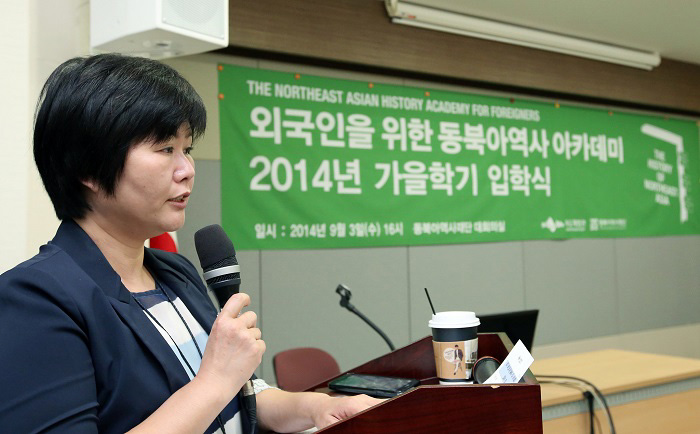
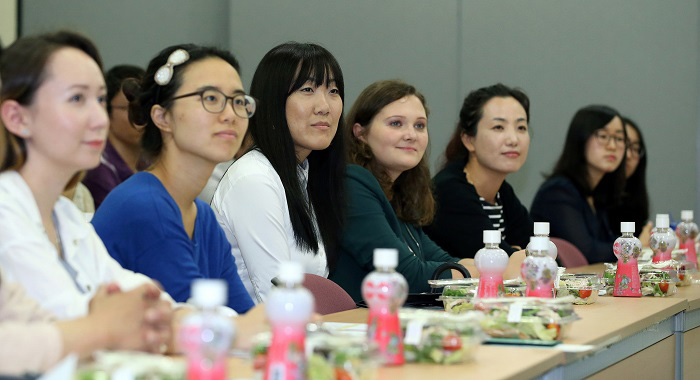
Opening its doors in September last year, the academy admits a new class twice a year, the first for the spring semester between March and June and the second for the autumn semester from September to December.
The academy aims to offer international students the chance to look at historical issues concerning Korea from many different perspectives, and also in relation to global history and cultures worldwide. Through a variety of programs, the students are allowed to come up with their own solutions to historical conflicts between neighboring countries from around the world.
This year, the academy selected its newest class of 50 international students from 16 countries. They will attend a series of classes every Wednesday, all taught by experts in their field, including history teachers and some researchers from the Northeast Asia Foundation. The classes last for two hours and are conducted in Korean. They center on Korean history spanning from the Gojoseon or Ancient Joseon period (2333 B.C.-108 B.C.) all the way up to modern times.
There will be more lectures to come, as well, focusing on pending historical issues concerning Northeast Asia, such as conflicts over the sovereignty of the Dokdo rocks between Korea and Japan, the so-called "Northeast Project," the Beijing government's attempts to distort Northeast Asian history, and controversies over Japanese history textbooks that either contain historical lies or omit truths.
In addition to the classes, the students will visit Ullengdo Island, Dokdo and sections of the Demilitarized Zone (DMZ) that divides the Korean Peninsula.
This year’s academy will run for 15 weeks, with the first class to start on September 10. A completion ceremony will be held on December 17 as the academy completes the semester.
“The four-month programs we provide here will help a select group of international students to freely talk about and share their thoughts on any historical issue from their own perspective, rather than just trying to get the 'right answers,'” said Lee Do-hyung, one of the faculty members at the academy, during the ceremony.
Any non-Korean student aged 18 or over is eligible to apply to the academy. For more information about the school, please visit its website at http://www.historyfoundation.or.kr or http://www.dokdohistory.com/kr/.
Written by Lee Jeong-rok, Sohn JiAe
Photos: Jeon Han
jeongrok@korea.kr
Korea.net sat down with one of the 50 students in this year’s third class at the Northeast Asian History Academy for Foreigners. It was Moritz Haarstick from Germany.
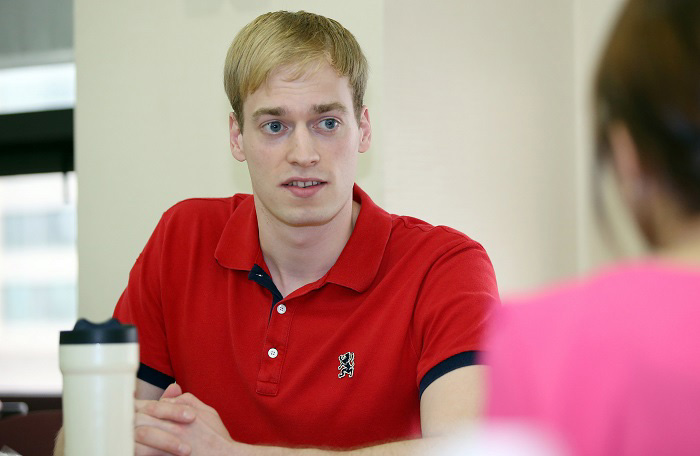
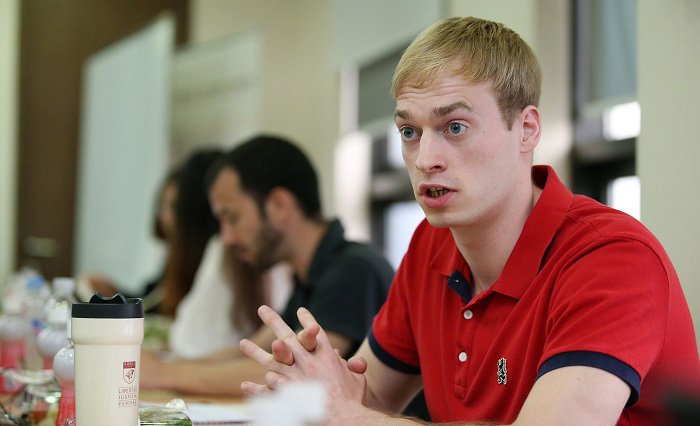
- How did you first learn about the Northeast Asian History Academy for Foreigners?
I majored in Korean studies and politics at Korea University as an exchange student. One of my classmates introduced me to this wonderful program.
- Are there any special reasons why you decided to study in Korea? What did you think about Korea before you came here?
Quite a few college students choose to study or work abroad. At first, I came here on a working holiday. Why Korea? The country has quite different culture and history from Australia or the U.S., which I found fascinating. When I was in Germany, I had no idea about the country. Many Germans think of this country as a "divided country” and “the country of the traditional martial art taekwondo.” Even if they use Samsung cellular phones, they don’t know who made them.
- Tell us about what got you specifically into Korean history, as opposed to modern Korean pop music or mass media.
I believe that Germany is responsible for Europe's World Wars. We, Germans, acknowledge that all the bucks stop with us. We teach and study history. I don’t think that the history of Korea, a country with painful memories of the past under the shadow of world powers, has anything to do with our history. That’s why I want to study and dig deeper into the histories of these two countries.
- Are there any things you expect to achieve from the academy? What would they be?
I believe the classes offered at the academy approach history from many different angles, rather than from one specific angle. The programs focus on looking at and analyzing history from various angles, not simply introducing theories related to history. In particular, people from many diverse countries are part of the program and I hope to see many ideas and discussions about many historical issues flow during the classes here.
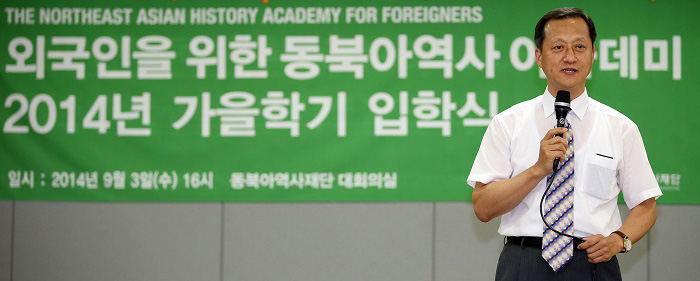
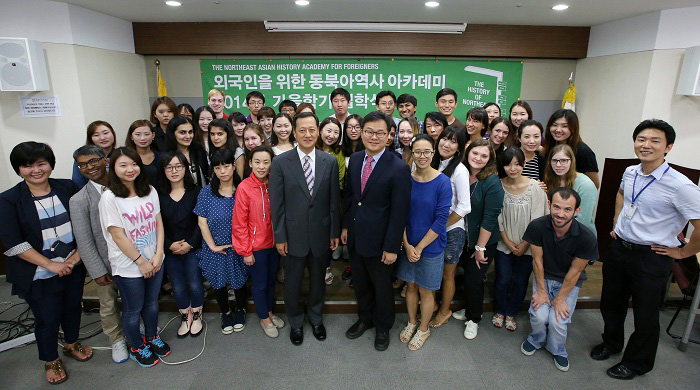
People from around the world are gradually learning more about Korea, moving beyond its mass media that has been, for many, their sole impression of the country. They are slowly branching out into new territories covering both Korean history and, more broadly, the modern history of Northeast Asia.
To meet this growing demand, the Korean government has set up a special academy designed for international students who are eager to learn more about the Korean version of Northeast Asian history.
On September 3, the Dokdo Research Institute, part of the Northeast Asian History Foundation, initiated the new semester at the Northeast Asian History Academy for Foreigners, helping it to launch its third class in two years.


Students attending the Northeast Asian History Academy for Foreigners listen as director Chung Young-mi (top) of the Dokdo Museum Seoul outlines the lectures to be offered throughout the four-month semester, on September 2.
Opening its doors in September last year, the academy admits a new class twice a year, the first for the spring semester between March and June and the second for the autumn semester from September to December.
The academy aims to offer international students the chance to look at historical issues concerning Korea from many different perspectives, and also in relation to global history and cultures worldwide. Through a variety of programs, the students are allowed to come up with their own solutions to historical conflicts between neighboring countries from around the world.
This year, the academy selected its newest class of 50 international students from 16 countries. They will attend a series of classes every Wednesday, all taught by experts in their field, including history teachers and some researchers from the Northeast Asia Foundation. The classes last for two hours and are conducted in Korean. They center on Korean history spanning from the Gojoseon or Ancient Joseon period (2333 B.C.-108 B.C.) all the way up to modern times.
There will be more lectures to come, as well, focusing on pending historical issues concerning Northeast Asia, such as conflicts over the sovereignty of the Dokdo rocks between Korea and Japan, the so-called "Northeast Project," the Beijing government's attempts to distort Northeast Asian history, and controversies over Japanese history textbooks that either contain historical lies or omit truths.
In addition to the classes, the students will visit Ullengdo Island, Dokdo and sections of the Demilitarized Zone (DMZ) that divides the Korean Peninsula.
This year’s academy will run for 15 weeks, with the first class to start on September 10. A completion ceremony will be held on December 17 as the academy completes the semester.
“The four-month programs we provide here will help a select group of international students to freely talk about and share their thoughts on any historical issue from their own perspective, rather than just trying to get the 'right answers,'” said Lee Do-hyung, one of the faculty members at the academy, during the ceremony.
Any non-Korean student aged 18 or over is eligible to apply to the academy. For more information about the school, please visit its website at http://www.historyfoundation.or.kr or http://www.dokdohistory.com/kr/.
Written by Lee Jeong-rok, Sohn JiAe
Photos: Jeon Han
jeongrok@korea.kr
Korea.net sat down with one of the 50 students in this year’s third class at the Northeast Asian History Academy for Foreigners. It was Moritz Haarstick from Germany.


Moritz Haarstick, an exchange student from Germany who was selected to be one of the members of the third class at the Northeast Asian History Academy for Foreigners, speaks about his hope to study more about Korean and German history.
- How did you first learn about the Northeast Asian History Academy for Foreigners?
I majored in Korean studies and politics at Korea University as an exchange student. One of my classmates introduced me to this wonderful program.
- Are there any special reasons why you decided to study in Korea? What did you think about Korea before you came here?
Quite a few college students choose to study or work abroad. At first, I came here on a working holiday. Why Korea? The country has quite different culture and history from Australia or the U.S., which I found fascinating. When I was in Germany, I had no idea about the country. Many Germans think of this country as a "divided country” and “the country of the traditional martial art taekwondo.” Even if they use Samsung cellular phones, they don’t know who made them.
- Tell us about what got you specifically into Korean history, as opposed to modern Korean pop music or mass media.
I believe that Germany is responsible for Europe's World Wars. We, Germans, acknowledge that all the bucks stop with us. We teach and study history. I don’t think that the history of Korea, a country with painful memories of the past under the shadow of world powers, has anything to do with our history. That’s why I want to study and dig deeper into the histories of these two countries.
- Are there any things you expect to achieve from the academy? What would they be?
I believe the classes offered at the academy approach history from many different angles, rather than from one specific angle. The programs focus on looking at and analyzing history from various angles, not simply introducing theories related to history. In particular, people from many diverse countries are part of the program and I hope to see many ideas and discussions about many historical issues flow during the classes here.

Lee Du-hyeong outlines the classes to be offered during the four-month semester at the Northeast Asian History Academy for Foreigners.

Members of the third class at the Northeast Asian History Academy for Foreigners attend the semester's opening ceremony on September 2.
Most popular
- First hearing-impaired K-pop act hopes for 'barrier-free world'
- Event 'K-Beauty Hang Out' draws hundreds in Philippines
- Ceremony in Seoul inducts 2,641 content creators of Korean culture
- 'Mad Max' director impressed by 'cinema-literate' Korean viewers
- Cultural spring festival Seoul Festa to start on May 1




